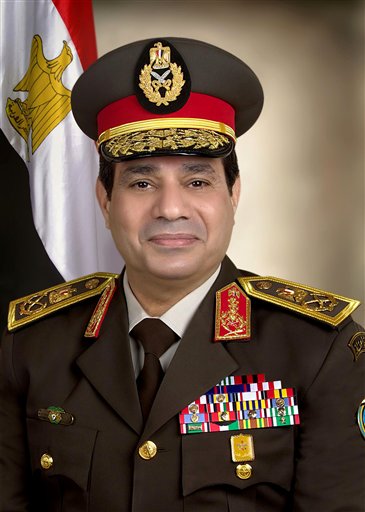
By MAGGIE MICHAEL
In this undated image released on the official Facebook page of the Egyptian Military Spokesman of the Armed Forces, Egyptian army chief Field Marshal Abdel-Fattah el-Sissi poses for a portrait in Cairo, Egypt. (AP Photo/The Official Facebook Page of the Egyptian Military Spokesman of the Armed Forces)
CAIRO (AP) — Egypt’s army chief headed to Moscow on Wednesday in his first visit outside the country since the ouster of its Islamist president and amid reports of a $2 billion arms deal that would significantly expand Russia’s influence with a key U.S. ally in the Middle East.
In Moscow, Field Marshal Abdel-Fattah el-Sissi was scheduled to meet Russian President Vladimir Putin and speak at a joint press conference with his Russian counterpart, Egypt’s state news agency MENA reported.
According to the state-owned daily Al-Ahram, the purpose of el-Sissi’s visit was to conclude a $2 billion arms deal funded mainly by Saudi Arabia and the United Arab Emirates. Gen. Hossam Sweilam, a retired Egyptian army general who maintains close contact with the military, also said the deal would be finalized in Moscow.
The visit comes nearly three months after Russian Foreign Minister Sergey Lavrov and Defense Minister Sergei Shogiu visited Cairo.
Moscow has been trying to expand its influence in Egypt at a time when Egyptian-U.S. relations soured in the aftermath of President Mohammed Morsi’s ouster last July and the subsequent crackdown on his Islamist supporters that has left hundreds dead and thousands arrested. The United States has been Cairo’s chief foreign backer and benefactor since the 1970s.
El-Sissi , who overthrew Morsi after days of mass street protests demanding he step down, is widely expected to announce he will run for president in elections likely due in late April.
The military chief has become hugely popular among a large segment of Egyptians who see him as a savoir of the nation after Morsi’s year-long rule during which he faced allegations that he and his Muslim Brotherhood group were abusing power.
Arab Gulf countries have thrown their weight behind the Egyptian military and el-Sissi’s potential candidacy in what analysts say is an effort to “compensate” for the gradual withdrawal of U.S. support to its longtime ally.
Egypt’s Foreign Minister Nabil Fahmy who is accompanying el-Sissi in the trip to Moscow, had sought to downplay speculation of a major foreign policy shift during the Russian delegation’s visit three months ago.
At the time, Fahmy said the visit was only an “activation” of existing ties and a sign of cooperation between the two countries “in multiple fields.”
In November, Russia’s Interfax news agency said that Egypt has shown interest in purchasing Russian air defense missile systems and MiG-29 fighter jets, combat helicopters and other weapons.
Mustafa al-Ani, head of the UAE-based think-tank Security and Defense Studies at the Gulf Research Center said the purchase would showcase the Gulf’s support for Egypt’s post-Morsi authorities.
“This is a real investment in helping Egypt’s democratic experience succeed through assistance, military aid and other means,” Alani said.
Egypt has been the second-largest recipient — after Israel — of U.S. bilateral foreign assistance, largely as a way to sustain the 1979 Egypt-Israeli peace treaty. Washington froze a large chunk of about $1.5 billion in annual aid, mostly for the military, in October.
Egypt was Moscow’s closest Arab ally for two decades starting in the 1950s, when the Soviet Union supported the late nationalist leader Gamal Abdel-Nasser’s ambitious drive to modernize the Arab nation and create a well-armed military at the height of the Cold War and the Arab-Israeli conflict.
Since Morsi ouster, Egypt has seen a wave of militant attacks in the Sinai Peninsula and beyond, including in Cairo, and has been hit by bombings and suicide attacks that have targeted police and military, leaving scores dead and wounded.
On Wednesday, three policemen were killed by unidentified gunmen in a drive-by shooting on a highway east of the capital, Cairo.



